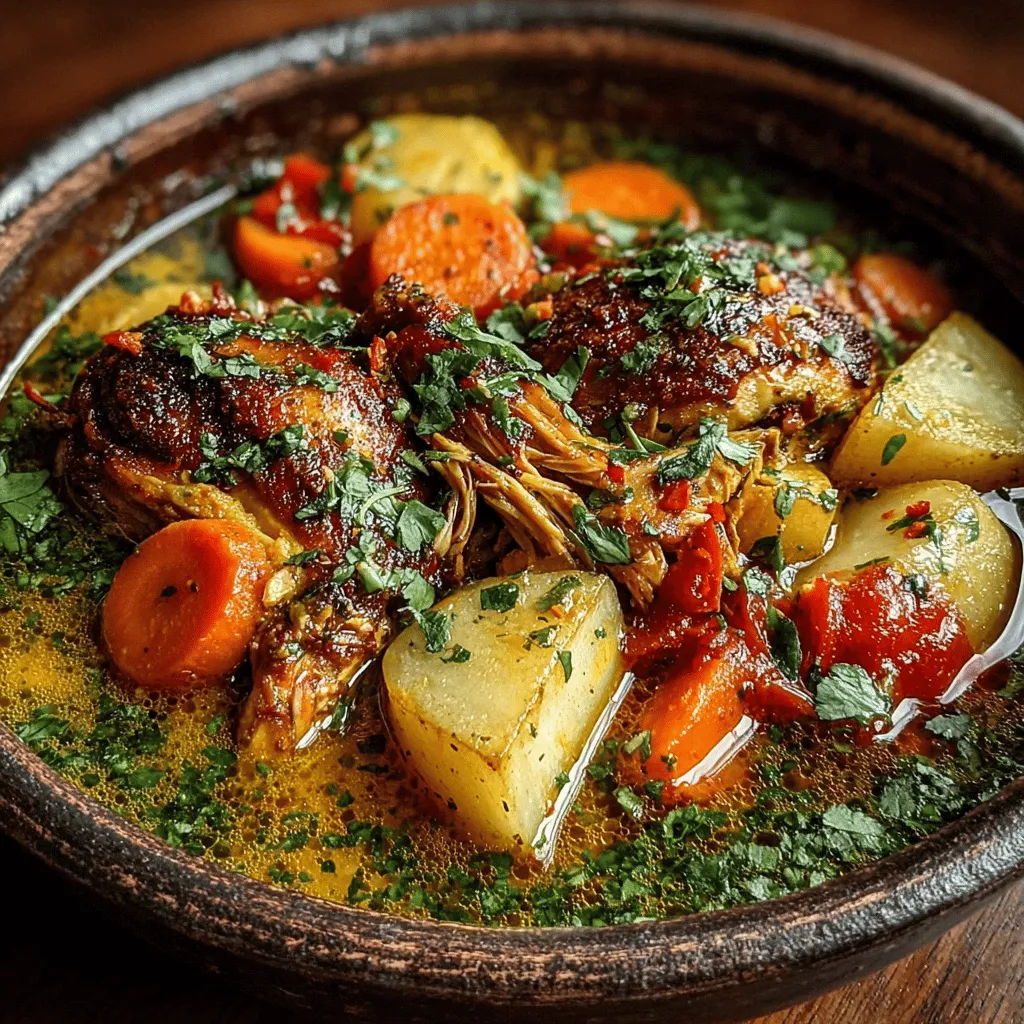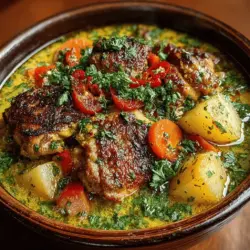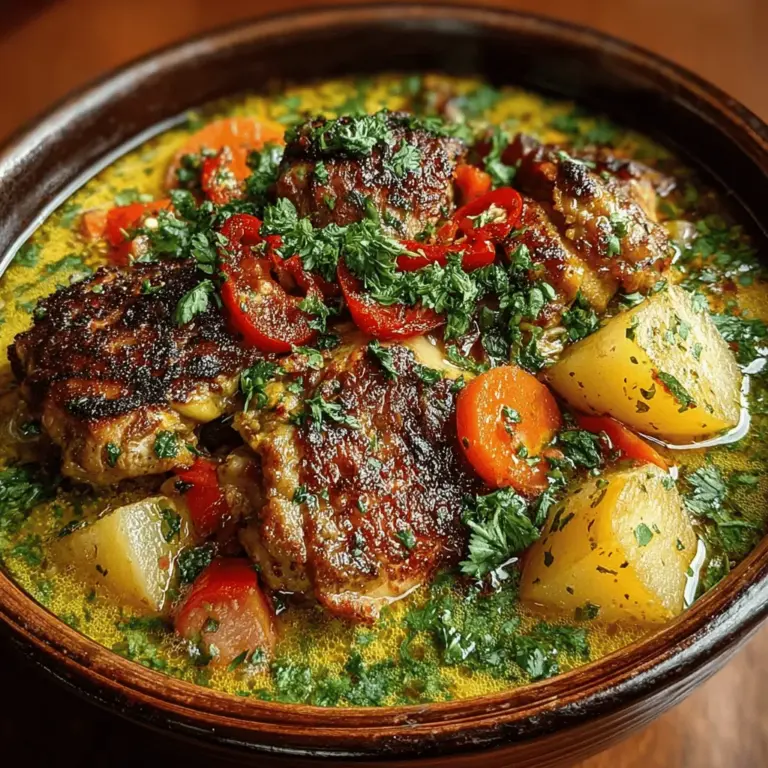Spicy Guyanese Chicken Curry Delight: A Flavorful Journey into Guyanese Cuisine
Guyanese cuisine is a vibrant tapestry woven from a rich cultural heritage that reflects the influences of indigenous peoples, African traditions, Indian spices, and British colonial flavors. Each dish tells a story, and one of the most iconic representations of this culinary landscape is the Spicy Guyanese Chicken Curry Delight. This dish stands as a testament to the bold and harmonious flavors that define Guyanese cooking, making it a staple in households and a must-try for adventurous food lovers.
At the heart of Spicy Guyanese Chicken Curry Delight lies a careful balancing act of spices and textures that create a symphony of flavor on the palate. The dish boasts tender chicken simmered in a fragrant sauce enriched with a medley of spices, fresh herbs, and coconut milk. This harmonious blend not only tantalizes the taste buds but also embodies the spirit of togetherness that is central to Guyanese culture. Whether served at a festive gathering or a simple family meal, this chicken curry captures the essence of warmth and hospitality.
Understanding the Ingredients
Before diving into the cooking process, it’s essential to understand the key ingredients that make up this delectable dish. The foundation of Spicy Guyanese Chicken Curry Delight consists of chicken, an array of spices, and vegetables, all of which play a pivotal role in delivering authentic flavors. The choice of chicken is crucial; using bone-in pieces not only enhances the taste but also contributes to a richer sauce.
In addition to chicken, spices such as cumin, coriander, turmeric, and allspice are indispensable. These spices are not just for flavor; they carry significant nutritional benefits. For instance, turmeric is renowned for its anti-inflammatory properties, while cumin aids in digestion. Fresh ingredients like bell peppers, onions, and tomatoes add not only vibrant colors but also essential vitamins and minerals, enhancing the dish’s overall nutritional profile. Coconut milk, which enriches the curry sauce, brings a creamy texture while providing healthy fats.
Using fresh and authentic ingredients is paramount in Guyanese cooking. The bright flavors of fresh herbs such as cilantro and green onions elevate the dish, while dried spices should ideally be freshly ground to unlock their full aromatic potential. When sourcing your ingredients, consider visiting local markets to find the freshest produce and spices, which will ultimately enhance the flavor of your curry.
Marinating the Chicken: A Step Towards Flavor
Marinating is a crucial step in achieving maximum flavor in the Spicy Guyanese Chicken Curry Delight. This process allows the chicken to absorb the spices and develop a deeper, more complex flavor profile. Ideally, the chicken should be marinated for at least one hour, but for optimal results, leaving it overnight in the refrigerator can yield a more intense and satisfying taste.
To marinate the chicken, begin by mixing your chosen spices with a bit of oil, vinegar, or yogurt to create a paste. Rub this mixture thoroughly over the chicken pieces, ensuring that every nook and cranny is coated. For those looking to add a personal twist, consider incorporating additional spices such as smoked paprika for a hint of smokiness or a dash of lemon juice for brightness. Fresh herbs like thyme or cilantro can also be added to the marinade for an extra layer of flavor.
It’s important to note that marination isn’t just about flavor; it also helps tenderize the meat, ensuring that the chicken remains juicy and succulent during the cooking process. As the chicken marinates, the spices penetrate the meat, creating a depth of flavor that is characteristic of Guyanese cuisine.
Creating the Flavor Base
Once the chicken has marinated to perfection, the next step is to create the flavor base for the curry. This begins with sautéing onions, which serve as the backbone of the dish. Onions release their natural sugars when cooked, providing a sweet undertone that balances the heat from the spices.
In addition to onions, key aromatics such as garlic, ginger, and chilies are essential for building the dish’s foundation. Garlic and ginger contribute a fragrant warmth, while chilies infuse the dish with heat. The combination of these ingredients creates a complex flavor profile that is both inviting and invigorating.
To achieve the perfect sauté, heat a generous amount of oil in a heavy-bottomed pot over medium heat. Once the oil is shimmering, add the onions and sauté until they become translucent and golden. This process usually takes about 5-7 minutes. Be cautious not to let the onions burn; if they start to darken too quickly, reduce the heat. After the onions are cooked, add the minced garlic, ginger, and sliced chilies, stirring continuously for another minute until the aromatics are fragrant. This careful sautéing forms the flavorful foundation upon which the rest of the dish will be built.
Cooking the Chicken to Perfection
With the flavor base established, it’s time to introduce the marinated chicken to the pot. Begin by ensuring that the heat is at a medium-high setting. Adding the chicken in batches may be necessary to avoid overcrowding the pot, which helps in achieving a perfect sear. Browning the chicken is vital, as it caramelizes the surface and adds depth to the overall flavor of the curry.
Once the chicken is added, allow it to cook undisturbed for a few minutes before turning it to ensure even browning. This step not only locks in the juices but also creates a beautiful golden crust that enhances the dish’s appearance and flavor. After the chicken is browned on all sides, reduce the heat slightly and continue to cook, stirring occasionally, until the chicken is cooked through.
Maintaining moisture is essential during cooking. To achieve this, consider adding a splash of water or broth if the pot appears dry. This will help the chicken cook evenly and prevent it from becoming tough. A well-cooked chicken will be tender, juicy, and infused with the vibrant flavors of the spices and aromatics.
Incorporating Tomatoes and Spices
As the chicken nears completion, it’s time to elevate the dish by incorporating tomatoes and additional spices. Chopped tomatoes not only provide acidity, which balances the richness of the coconut milk, but they also contribute a natural sweetness that enhances the overall flavor.
Once the chicken is fully cooked, add the chopped tomatoes, stirring to combine them with the chicken and the aromatic base. This mixture should be allowed to simmer for a few minutes, allowing the tomatoes to break down and meld with the other ingredients. At this stage, you can also add any additional spices that you desire, such as garam masala or curry powder, to deepen the flavor complexity.
The final step in this flavor-building process is to add coconut milk, which will transform the dish into a creamy, luscious curry. Coconut milk not only adds richness but also balances the spices’ heat, creating a comforting and satisfying dish that is perfect for any occasion.
Now that we have laid the groundwork for this exquisite recipe, the next steps will guide you through the finishing touches that will make your Spicy Guyanese Chicken Curry Delight a true showstopper. Stay tuned for the continuation of this culinary adventure, where we will explore the final cooking stages and tips for serving this delicious dish.

The Role of Tomatoes in Flavor and Texture
Tomatoes play a crucial role in the Spicy Guyanese Chicken Curry Delight, enhancing both the taste and texture of the dish. Their natural acidity balances the rich spices, creating a well-rounded flavor profile. When cooked down, tomatoes break down into a luscious sauce that envelops the chicken and vegetables, resulting in a velvety texture that is simply irresistible. The sweetness of ripe tomatoes counteracts the heat from the spices, making the dish more palatable for those who prefer milder flavors while still delivering a satisfying kick.
Moreover, tomatoes are a rich source of vitamins, including vitamin C and potassium, adding nutritional value to your curry. When selecting tomatoes for this recipe, opt for ripe, fresh tomatoes or high-quality canned tomatoes to ensure the best flavor. This ingredient not only contributes to the dish’s taste but also adds a vibrant color that makes your curry visually appealing.
The Spice Spectrum: Cumin and Curry Powder
The spices you choose for your Guyanese chicken curry are fundamental to the overall flavor profile. Cumin and curry powder are two key ingredients that bring warmth and depth to the dish.
Cumin, with its earthy and slightly nutty flavor, originates from the Mediterranean and South Asian regions. It has been used for centuries in various cuisines, providing an aromatic base that enhances the taste of meats and vegetables alike. When toasted slightly before adding to your dish, cumin releases its essential oils, amplifying its flavor and aroma.
Curry powder, a blend of spices, varies widely depending on the region and personal preferences. Common ingredients include turmeric, coriander, and fenugreek, each contributing distinct flavor notes. Originating from Indian cuisine, curry powder has become a staple in many kitchens around the world, adding complexity and warmth to dishes. The vibrant yellow hue of curry powder not only adds visual appeal but also signals the depth of flavor waiting to be explored.
Adjusting Spice Levels for Personal Preference
One of the beautiful aspects of cooking is the ability to tailor recipes to suit your tastes. If you find the heat of the spices in this Guyanese chicken curry too intense, you can easily adjust the spice levels. Start by reducing the amount of curry powder or adding additional ingredients like coconut milk, which naturally mellows the heat while enriching the dish’s flavor.
Alternatively, if you’re a fan of heat, consider adding finely chopped fresh chilies or a pinch of cayenne pepper to elevate the spice level to your liking. Remember, the key is to taste as you go; this way, you can achieve the perfect balance that suits your palate.
Adding Liquid: The Heart of the Curry
The right balance of liquids is essential for achieving the perfect consistency in your Spicy Guyanese Chicken Curry Delight. Coconut milk and chicken broth are the stars of this show, working together to create a creamy and luscious sauce that clings to the chicken and vegetables.
Coconut milk adds a rich, tropical flavor and a silky texture, which contrasts beautifully with the spices. It not only thickens the curry but also imparts a subtle sweetness that balances the heat. Meanwhile, chicken broth serves to enhance the savory depth of the dish, ensuring that every bite is packed with flavor.
Achieving the Perfect Texture
When combining these liquids, it’s important to find the right balance between the liquid and solid ingredients. Too much liquid can lead to a soup-like consistency, while too little can result in a dry curry. A good rule of thumb is to start with a cup of coconut milk and a cup of chicken broth for every pound of chicken used, adjusting as necessary depending on your desired thickness.
For optimal flavor extraction, bring your curry to a gentle simmer once all ingredients are combined. This low and slow cooking method allows the spices to bloom, releasing their essential oils and flavors into the dish. Maintain a simmering temperature rather than a rolling boil to prevent the chicken from becoming tough and to avoid any sticking to the pot.
Vegetable Medley: Enhancing Texture and Nutrition
Adding vegetables to your Guyanese chicken curry not only boosts its nutritional profile, but it also enhances the overall texture and appearance of the dish. Popular choices include potatoes and carrots, which add substance and a slight sweetness.
Choosing the Right Vegetables
Potatoes are a staple in many curries, providing a comforting and filling element. They absorb the flavors of the curry while adding a creamy texture when cooked. Carrots contribute both color and crunch, making for a vibrant medley. If you’re looking for alternatives, consider adding bell peppers, peas, or green beans for added nutrition and flavor.
Cooking Techniques for Firm Vegetables
To ensure your vegetables retain some firmness and don’t turn mushy, add them to the pot at the right time during the cooking process. Begin simmering the chicken and curry base first, and then add the potatoes and carrots about halfway through the cooking time. This way, they will be tender yet still maintain their structure, providing a delightful contrast to the tender chicken.
The Simmering Process: Building Depth of Flavor
Simmering is a crucial step in developing the rich flavors of your Spicy Guyanese Chicken Curry Delight. This process allows all the ingredients to meld together, creating a harmonious blend of spices, chicken, and vegetables.
Monitoring Heat for Perfect Simmering
As you simmer, keep an eye on the heat level. Too high of a temperature can cause the curry to boil, which may lead to tough chicken and a loss of flavor. Aim for a gentle simmer where you can see small bubbles forming but not boiling vigorously. Stir occasionally to ensure that nothing sticks to the bottom of the pot, which can create an unpleasant burnt flavor.
Preventing Sticking
To prevent the curry from sticking, consider using a heavy-bottomed pot or Dutch oven, which distributes heat evenly. A splash of additional chicken broth or coconut milk can also help loosen any bits that may begin to stick.
Finishing Touches: Garnishing and Serving Suggestions
After simmering to perfection, it’s time to focus on the finishing touches that will elevate your Spicy Guyanese Chicken Curry Delight. Fresh cilantro is an essential garnish, adding a burst of color and a fresh, herbal note that complements the rich flavors of the curry.
Serving Options
This curry pairs beautifully with traditional accompaniments. Serve it over a bed of fluffy white rice, which soaks up the delicious sauce, or alongside warm roti for a delightful textural contrast. For an added touch, consider serving it with a side of mango chutney or a simple cucumber salad to refresh the palate.
Beverage Pairings
When it comes to beverages, consider serving your curry with a chilled glass of coconut water or a light lager, which can help balance the spices. If you prefer non-alcoholic options, a refreshing mint lemonade pairs wonderfully with the warmth of the curry, enhancing the overall dining experience.
Conclusion
In conclusion, the Spicy Guyanese Chicken Curry Delight is more than just a meal; it’s a flavorful and comforting dish that brings the essence of Guyanese cuisine to your table. With its rich blend of spices, tender chicken, and vibrant vegetables, this curry is not only satisfying but also a celebration of culture and culinary heritage.
We encourage you to explore the world of Guyanese cuisine through this recipe and share it with loved ones. Cooking is not just about nourishing the body; it’s about creating memories and enjoying the process with those you care about. Embrace the joy of cooking, and let this Spicy Guyanese Chicken Curry Delight warm your home and heart.

